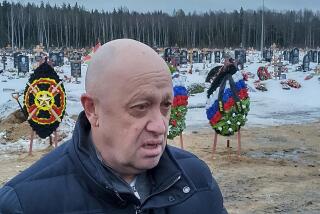Gorbachev Is Still Fully in Charge, Key Adviser Says
- Share via
MOSCOW — Rejecting Western speculation that President Mikhail S. Gorbachev is under intense pressure from the Soviet military, one of his top advisers said Friday that the country’s political leadership is still fully in charge in the Kremlin and that it remains committed to Gorbachev’s reform program of perestroika.
Alexander N. Yakovlev, a member of the Communist Party’s ruling Politburo, dismissed as completely unfounded recent assertions by Bush Administration officials in Washington and NATO analysts in Brussels that the Soviet army had demanded policy changes from Gorbachev and apparently had forced him to retreat in arms control negotiations.
“There is no basis for the claim that Gorbachev had to somehow change his policies in response to (military) pressure,” Yakovlev told a news conference. “We do not see any grounds to suspect that our army is hatching some kind of plans against the party, against the leadership. We do not believe this is the case.”
Yakovlev, reviewing the domestic political scene as well as Soviet foreign policy, said that he wanted to calm widespread Western speculation that portrays an embattled Gorbachev confronted with immense political and economic problems at home and consequently under increasing military pressure not to make concessions abroad.
While such speculation is common in advance of key Soviet-American meetings such as the Soviet-American summit in Washington starting May 30, the current round is being used to explain reported shifts in Moscow’s positions in the strategic arms reduction talks with Washington and the Vienna negotiations to reduce conventional forces in Europe.
As read here, the implication in much of the Washington speculation is that Gorbachev is not fully in charge, that the Soviet military might balk at the agreements he makes and that, as a result, the United States and its partners in the North Atlantic Treaty Organization should be cautious in making deals with a man who might be gone tomorrow.
Also implied in this speculation is a Soviet responsibility should the negotiations fail to produce agreements, once regarded as all but certain, before the Washington summit.
Yakovlev specifically denied a NATO intelligence report, released in Brussels on Thursday, that the Soviet military had mounted a show of force, reportedly arming 6,000 cadets, during massive anti-government protests here in late February as a warning to Gorbachev that it was ready to take over if political instability increased.
“There were no movements of military personnel,” Yakovlev said, “and no pressure was applied to Comrade Gorbachev. No demands were made on the government.”
However, Yakovlev, the most prominent liberal in the Kremlin leadership, did assert that “ultra-rightists,” by which he appeared to mean a wide variety of groups all along the country’s political fringe, are working to bring Gorbachev down and to destroy his political and economic reforms.
Commenting on the anti-government, anti-party demonstrations during the May Day parade in Red Square on Tuesday, Yakovlev confirmed that Gorbachev and other leaders, including himself, had left the reviewing stand because of the angry protests directed at them.
“The leadership left the tribune and left it for political reasons, being very strongly in disagreement with the ultra-right, conservative positions being expressed by people who had come onto the square,” Yakovlev said.
“My conviction is that this was an action by the ultra-right and those who stand behind them. For us, with our difficult and tragic history, it is simply impermissible to try to turn history back, which means to head into the abyss.
“I think that all the country’s democrats, all normal, decent and clear-thinking people . . . should be on their guard and see the very real danger,” he said.
Perestroika and its leaders are now under threat, Yakovlev added, from extremist groups that he characterized as “ultra-right”--though in Western political terms they appear to be on the far left--and as “conservative,” though they are even more disdained by conservatives within the Communist Party.
More to Read
Sign up for Essential California
The most important California stories and recommendations in your inbox every morning.
You may occasionally receive promotional content from the Los Angeles Times.













